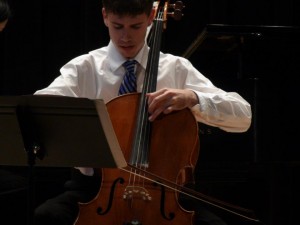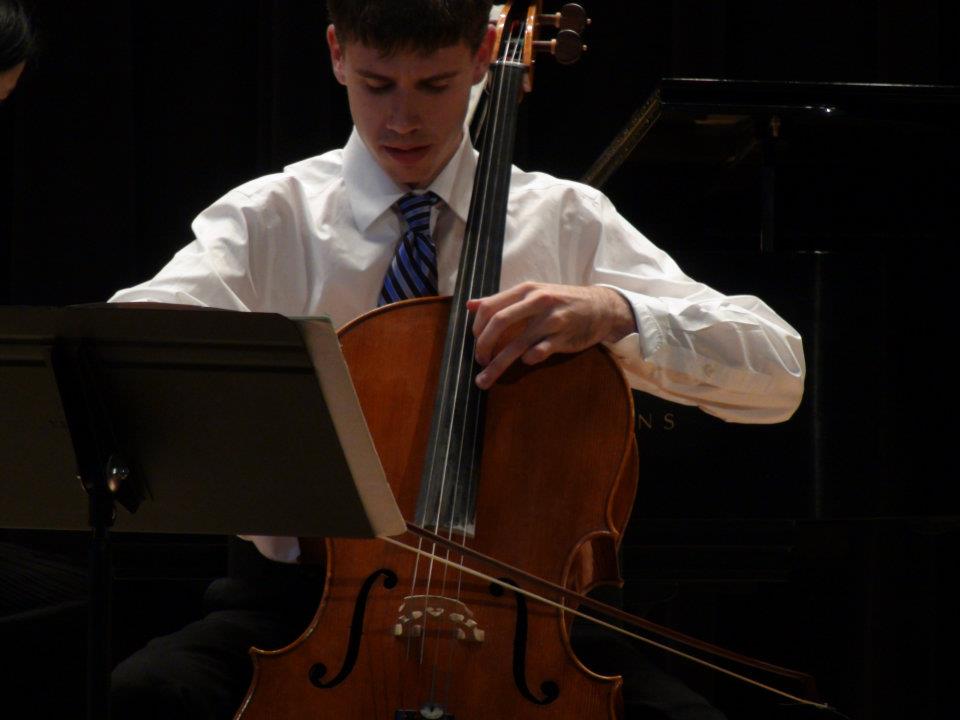Passion in Performance: How Excited Should We Get?
 It was the spring of my seventh grade year, and I was preparing for my junior high’s upcoming production of “Groovy,” a musical for middle schoolers set in the 1960s. I had auditioned for the lead role (a hippie named Travis who attempts to coordinate a Woodstock-esque carnival), but the fates had apparently not been in my favor, as I ended up being cast in the rather insignificant role of “Tork,” a vocalist in a Beatles imitation group called “The Lemon Bugs” (clearly, this musical hadn’t won any Tony awards). Although initially disappointed, I embraced the few lines I had with much enthusiasm and excitement, and was quite intrigued by the costumes the drama teacher had cooked up for us: shaggy black wigs and crisp suits with skinny ties. When opening night arrived, I belted out every song, milked every comedic line I could, and strummed the fake guitar they had given me like there was no tomorrow. My performance was greeted with much acclaim (and surprise, considering that I was quite shy in real life in my designated spot at the bottom of the social food chain), so on the following night, I amped up my presentation even more.
It was the spring of my seventh grade year, and I was preparing for my junior high’s upcoming production of “Groovy,” a musical for middle schoolers set in the 1960s. I had auditioned for the lead role (a hippie named Travis who attempts to coordinate a Woodstock-esque carnival), but the fates had apparently not been in my favor, as I ended up being cast in the rather insignificant role of “Tork,” a vocalist in a Beatles imitation group called “The Lemon Bugs” (clearly, this musical hadn’t won any Tony awards). Although initially disappointed, I embraced the few lines I had with much enthusiasm and excitement, and was quite intrigued by the costumes the drama teacher had cooked up for us: shaggy black wigs and crisp suits with skinny ties. When opening night arrived, I belted out every song, milked every comedic line I could, and strummed the fake guitar they had given me like there was no tomorrow. My performance was greeted with much acclaim (and surprise, considering that I was quite shy in real life in my designated spot at the bottom of the social food chain), so on the following night, I amped up my presentation even more.
Everything was going splendidly, and I was bringing in the laughs, until it came to the closing number, a fast and jazzy song featuring us storied “Lemon Bugs.” In the midst of the excitement, I leaned forward over my guitar and threw back my head in an exuberant cue, my twelve-year-old self bursting with passion. However, I had neglected to ensure that my wig was properly secured, and it flew right off, descending rapidly upon the unsuspecting hippies in back of me. I was mortified, but the audience, unable to contain themselves at the sight of my shocked expression (and my real hair sticking up as though I had actually been shocked), were roaring with laughter. Acting out the part had been great fun, I acknowledged as I hurriedly retrieved my escaped headwear from the giggling hippie girls–but perhaps I had gone a bit too far.
The “wig incident,” which was recounted regularly by my fellow students all the way through high school (I’m sure it will come up at the reunions, too), was only one instance of my youthful proclivity for performing with pathos. Throughout the many concerts I gave as a cellist and singer in my adolescent years (I did less drama after junior high, but I did take voice lessons), I would always rise to the occasion and become deeply expressive, moving dramatically and screwing up my face with poignant emotion. Sure, maybe it wasn’t in tune or together or really that good at all, but no audience member worth his salt could deny that I was certainly feeling the music. Indeed, my enthusiasm in performances was so evident (and frequent) that I garnered a reputation amongst my youth orchestra’s audiences as “that kid who looks so happy to play his cello!” (There are in fact a number of pictures in my family photo album of me performing at various orchestra concerts, in the middle of some utterly dramatic pose with my bow arm looking as though it was made of concrete.) Of course, I wasn’t employing the “moves” just for show; I was genuinely getting excited about what I was playing, and wasn’t ashamed at all in showing it.
I don’t know exactly when, but sometime at the beginning of college, I began to cut back on my exaggerated expressiveness. I am unsure whether there was a specific reason for my doing so; perhaps I suddenly became self-conscious, perhaps I recognized its negative impact on my technique (it would always cause a whole lot of tension), or perhaps I simply realized that while maybe I could convince people back home that I was performing well by making it look as though I was having a grand old time, people at the New England Conservatory wouldn’t care all that much if I was playing with the passion of du Pre but the intonation of an amateur. By this point, I had also had the opportunity to observe many professionals perform, and began to wonder whether it was really appropriate–or really necessary–to become so emotionally involved in a performance. Where did you draw the line between a genuine conveying of expression and unrestrained self-indulgence? Did getting into the music make the performance more about you than the piece itself?
This discussion is most certainly not a new one; one merely has to consider some of the most revered players of recent times to observe a marked contrast in physical expression. The late Janos Starker, whose doctrine on the matter was “create excitement; don’t get excited” (stated by his friend, the great pianist Gyorgy Sebok), was appropriately restrained in performances; Heifetz, too, was similarly self-restricted. Jacqueline du Pre was all over the place, complete with flying blonde hair and dramatic lurches that nearly sent her capitulating into the audience–there’s one spot in the last movement of the Elgar concerto where I swear she looks like an angry monkey. Then there’s Yo-Yo, who always looks as though he’s in love with his cello; Hilary Hahn, whose razor-sharp attention and focus gives her a remarkable sense of poise; or Joshua Bell, who often gives the impression during performances that the after-party has already started. Each of these artists are of course fantastic musicians and represent an ideal that every one of us should aspire to. But there remains the question of which model of expression we are to emulate–the calm, constrained demeanor or dramatic, unbridled hysteria?
In my personal search for a solution, I turned back to the discipline that first gave me the performance “bug”: drama. Considering the similarities between musical and dramatic presentation, it occurred to me that it would be remarkably ineffective for any actor to go onstage and recite their lines in a boring monotone with absolutely no expression whatsoever besides their vocal inflections. One could not, for example, deliver Hamlet’s famous soliloquy “To be or not to be” while staring determinedly at the floor (unless they were going for a rather unorthodox interpretation). I think the same can be said for musical performances–sure, we’re not saying words, but how could you get up and play the Dvorak concerto as if you were bored out of your mind? No, we are conveying the same ideas as our dramatic counterparts, and thus it follows that we should assume the appropriate character.
But only to an extent–for it would be unreasonably foolish of an actor to deliver “To be or not to be” whilst jumping up and down in ebullience and skipping across the stage merely for the joy of being able to show off his dramatic prowess in front of an audience. Getting “into it” is only okay so long as it is done for the right reasons–and self-indulgence is not one of them. From my personal experience, I know how difficult it can be to resist that overwhelming sense of excitement, joy and bliss when I’m playing a gorgeous melody on a vast stage–heck, I even have difficulty sitting still as an audience member sometimes–but that sort of emotion should, I think, be confined internally. Could some of those great artists have been merely reveling in their own remarkable abilities onstage? Well, only they could tell us, but I think some of them could have. I don’t think that’s a bad thing, either–I love watching Jackie du Pre–and I also don’t think it’s bad that people like Starker didn’t do the whole song and dance routine. In this discussion, I’m merely searching for an aesthetical ideal, and it seems that a compromise between the two opposing “camps,” if you will, is representative of that. So, for now my verdict is that we should get into it, but only to the extent that we are serving the character of the music. You want to invite your audience to enjoy a piece with you; you don’t want to simply be saying, “I just love playing this.” Especially if you happen to be wearing a wig.

